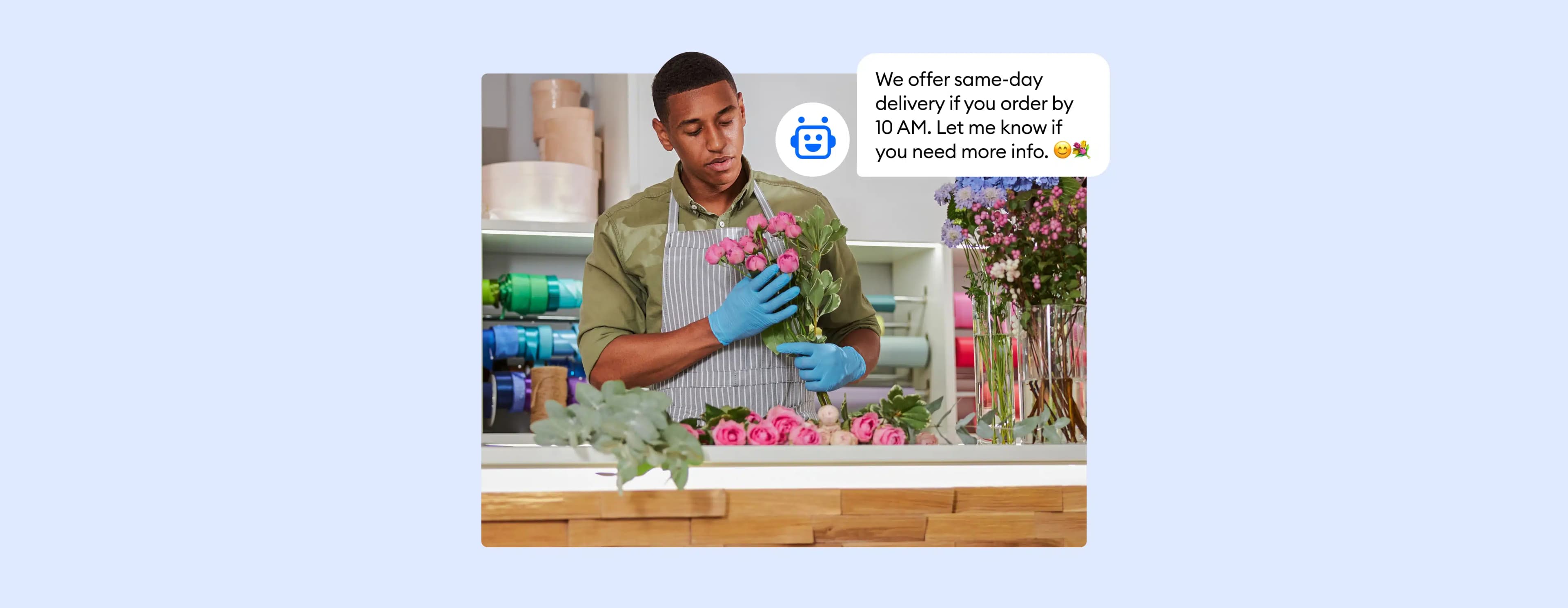The flower industry thrives on moments of joy and celebration.
But behind the scenes, peak seasons like Valentine’s Day and Mother’s Day can be a logistical whirlwind. The surge in orders and the endless customer questions across multiple channels make these occasions both a blessing and a challenge.
Many flower companies rely on temporary workers to ease the load, but this approach is like applying a bandage to a much deeper issue.
This is where AI-powered solutions step in. They offer a smarter way to handle operations, delight customers, and make peak seasons more manageable—and profitable.
Let’s talk about how Tidio can help your flower business
In this article, you’ll get a firsthand look at how AI solves the top customer service, marketing, and sales challenges in the floral industry.
How AI is transforming the floral industry
AI is helping flower companies break free from the cookie-cutter gifting mold, transforming the experience into something truly personalized and stress-free. Traditionally, shoppers were left to browse generic arrangements, often uncertain about quality or delivery outcomes. Now, AI acts as a personal floral guide, answering questions, offering tailored suggestions, and ensuring peace of mind.
For instance, a customer planning a surprise anniversary bouquet can describe their partner’s favorite colors or flowers, and the AI suggests a unique arrangement, guaranteeing a heartfelt gesture.
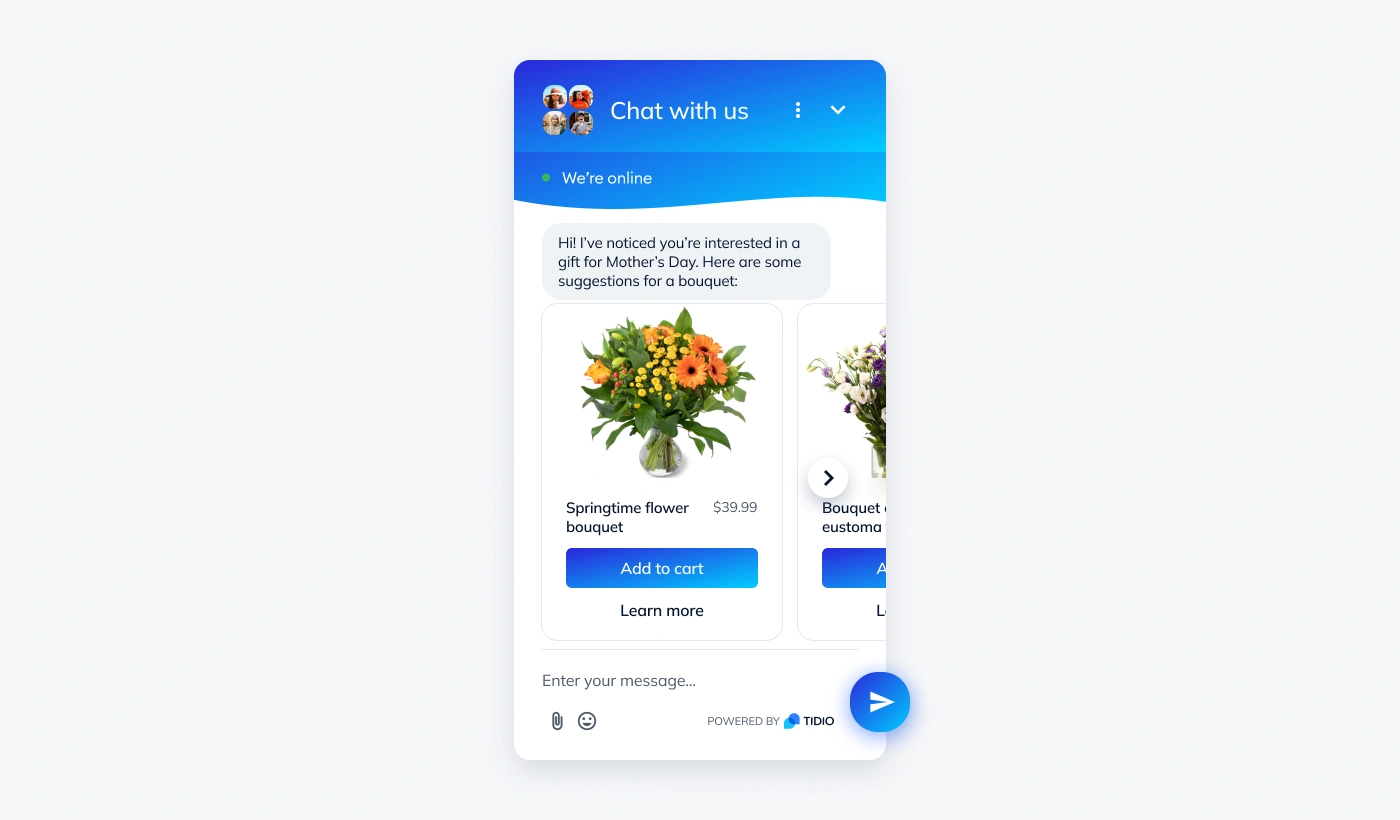
Beyond customer satisfaction, AI also boosts profitability by reducing the need for seasonal staff, streamlining operations during peak periods like Valentine’s Day or Mother’s Day.
It’s not just about flowers anymore—it’s about creating memorable moments with confidence and efficiency.
Key benefits of AI for floral companies
We’ve reached an era where AI chatbot solutions, like Tidio’s Lyro AI Agent, replace robotic rule-based systems with more intuitive, responsive technology.
Our conversational AI, Lyro, is an extension of your human agents that offers instant and personalized help to customers. The software can be trained for common problems in the flower industry and serve shoppers who have high expectations, especially when choosing something as personal as a heartfelt gift.
Here are the main benefits of AI for floral companies:
- Takes over routine tasks and questions: Automate common inquiries, freeing your team to focus on complex tasks and high-priority customer needs, especially during peak seasons.
- Increases your profitability: Lyro AI Agent manages 50% of customer inquiries guaranteed, cutting your overhead costs and reducing the need for additional or seasonal staff.
- Moves customers to checkout: Lyro’s smart product recommendations helps customers choose ideal arrangements or gifts, turning casual browsing into sales.
- Reduces cart abandonment: Proactive chat messages can remove any doubt shoppers may have when purchasing products.
- Organizes ticket chaos: Single inbox helps with complaint management and keeping track of all incoming inquiries.
All this sounds great, but how does it look in practice?
7 AI solutions for floral companies
AI is still relatively new to the flower industry but it’s making a great start.
Let’s say it’s Valentine’s Day and a customer visits your store but isn’t sure which flowers to choose. An AI-powered chatbot assists the customer in real-time by asking questions like, “What’s the occasion?”, “What’s your budget?”, or “Do they have a favorite flower or color?” Based on the answers, the software recommends personalized floral arrangements that align with preferences, occasion, and budget. AI can also leverage past purchase data to suggest items like add-ons, such as chocolates or vases.
But this is just one example — let’s look more into how to use AI at your flower company:
1. Manage high volume during peak seasons
Peak seasons like Valentine’s Day and Mother’s Day can be overwhelming for your flower company, with orders and inquiries flooding in all at once.
AI-powered customer service tools make it easier to keep up with this demand. For instance, chatbots can instantly answer common questions like, “Can you deliver roses tomorrow?” or “What’s your most popular bouquet for Mother’s Day?” They can also guide customers through the ordering process, ensuring they find the right gifts or arrangements without needing to wait for a human response. This means faster service for customers and less stress for your team.
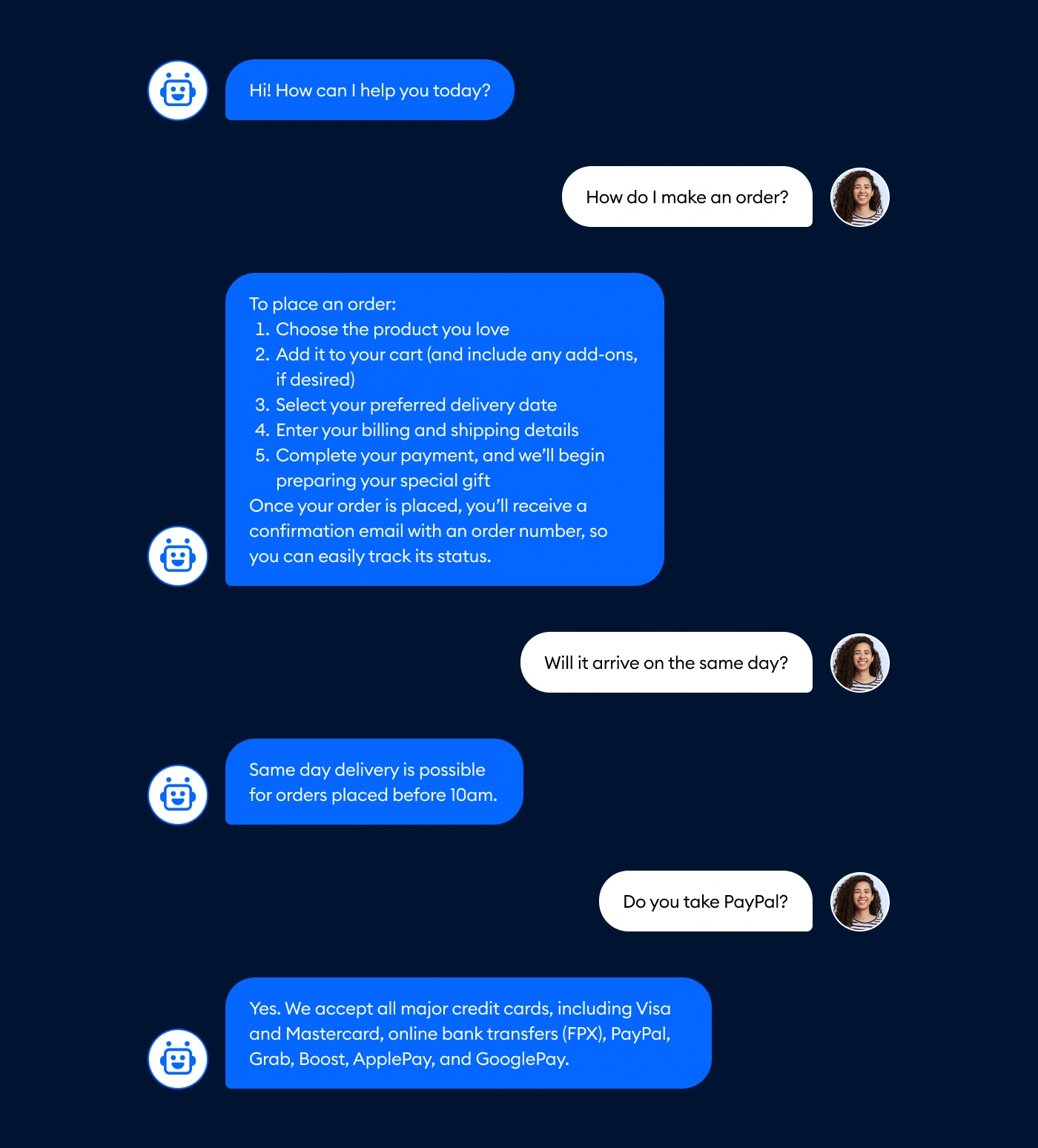
AI doesn’t just handle the basics—it also helps prioritize. For example, our Lyro AI Agent responds to inquiries across all popular support channels. So if a bride emails with last-minute changes to her wedding flowers, Lyro immediately forwards the request to the most appropriate agent. Meanwhile, routine questions, like delivery times, are handled automatically.
Using AI as part of your customer service strategy allows your team to focus on big-ticket or personalized orders while still ensuring every customer feels valued, no matter how busy things get.
Read more: Check out the step-by-step guide on how to set up Lyro.
2. Answer common delivery questions
AI plays a crucial role in addressing common delivery-related questions, ensuring customers receive quick and accurate responses.
For inquiries about the possibility of same-day delivery, AI chatbots provide immediate answers based on your business’ delivery policies and availability. They can also reassure customers about delivery cut off times, options for delivery in bad weather conditions, and addressing concerns like, “Can I choose a specific delivery time?”
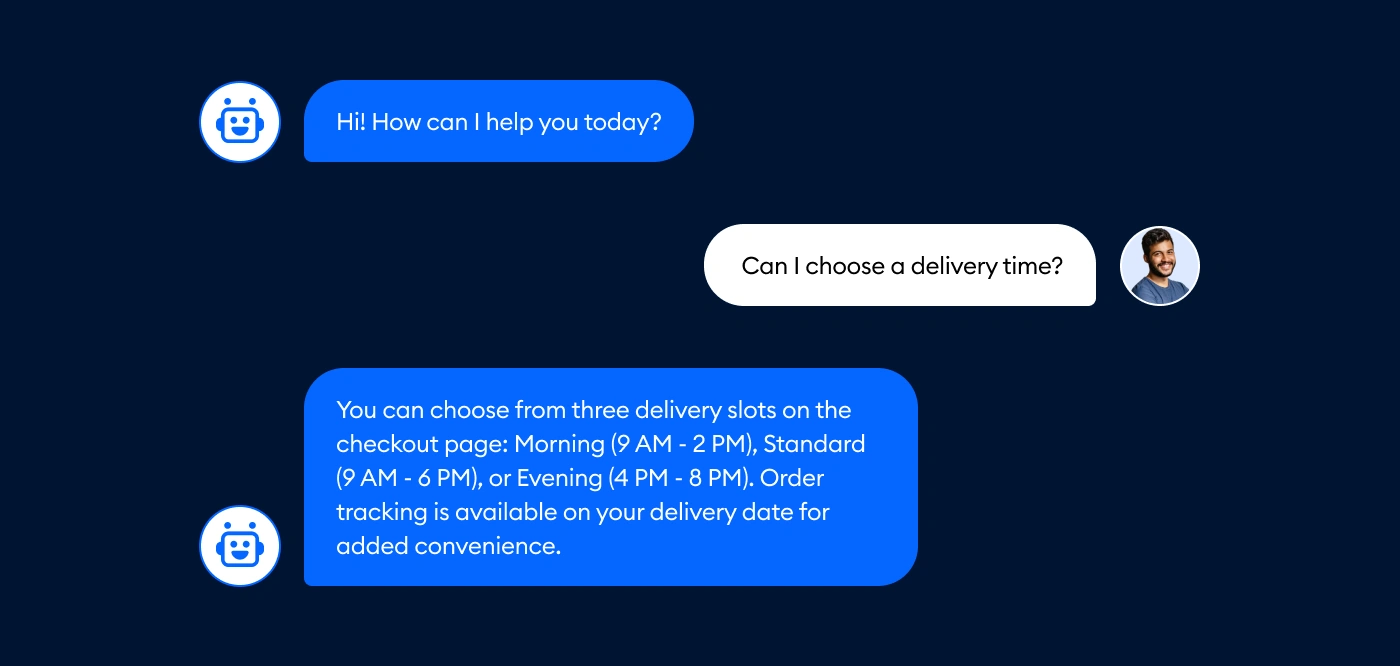
Additionally, AI offers clarity about contactless delivery. Customers increasingly value safety and convenience, often asking, “Does the recipient have to be home to accept the flowers?” or “Can the flowers be left at the door?” AI chatbots can instantly confirm whether contactless delivery is available and explain the process, such as leaving the arrangement at a specified location and notifying the recipient.
3. Create a personalized shopping experience
AI chatbots help you better connect with your target audience and improve your support, marketing, and sales efficiency.
Placing proactive, decision tree chatbots on crucial pages encourages customers to ask for help, avoid cart abandonment, and take advantage of deals. All in a conversational way.
For customers that reach out to your AI for shopping help, Lyro is the only AI Agent that offers product recommendations in the chat. When visitors ask questions about your products, Lyro AI retrieves relevant product information and generates accurate, context-aware responses based on your specific product data.
Customers can share what kind of arrangement they’re looking for within a certain price range, and Lyro can recommend specific products, alternative options, and even complementary gifts. This personalized approach helps you increase sales and boost the shopper’s experience.
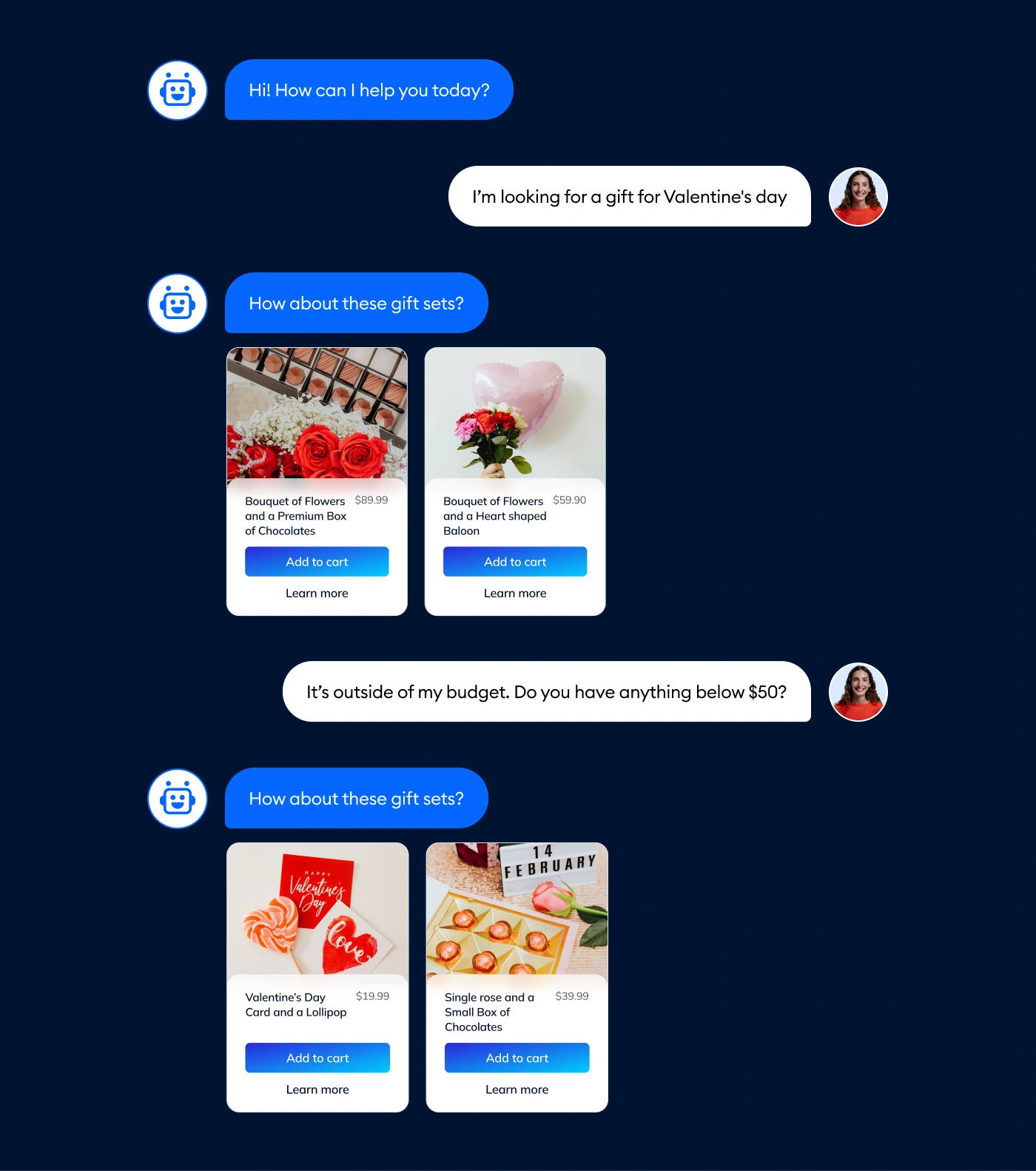
Read more: Discover the most popular chatbot templates you can use when building your chat flow. Also, discover how to use chatbot marketing to its full potential.
4. Connect all your communication channels
With an AI-powered help desk, you can seamlessly integrate and manage customer interactions across email, chat, social media, and more from a single platform. This allows you to efficiently track interactions, respond faster, and provide consistent support, no matter how customers choose to reach out.
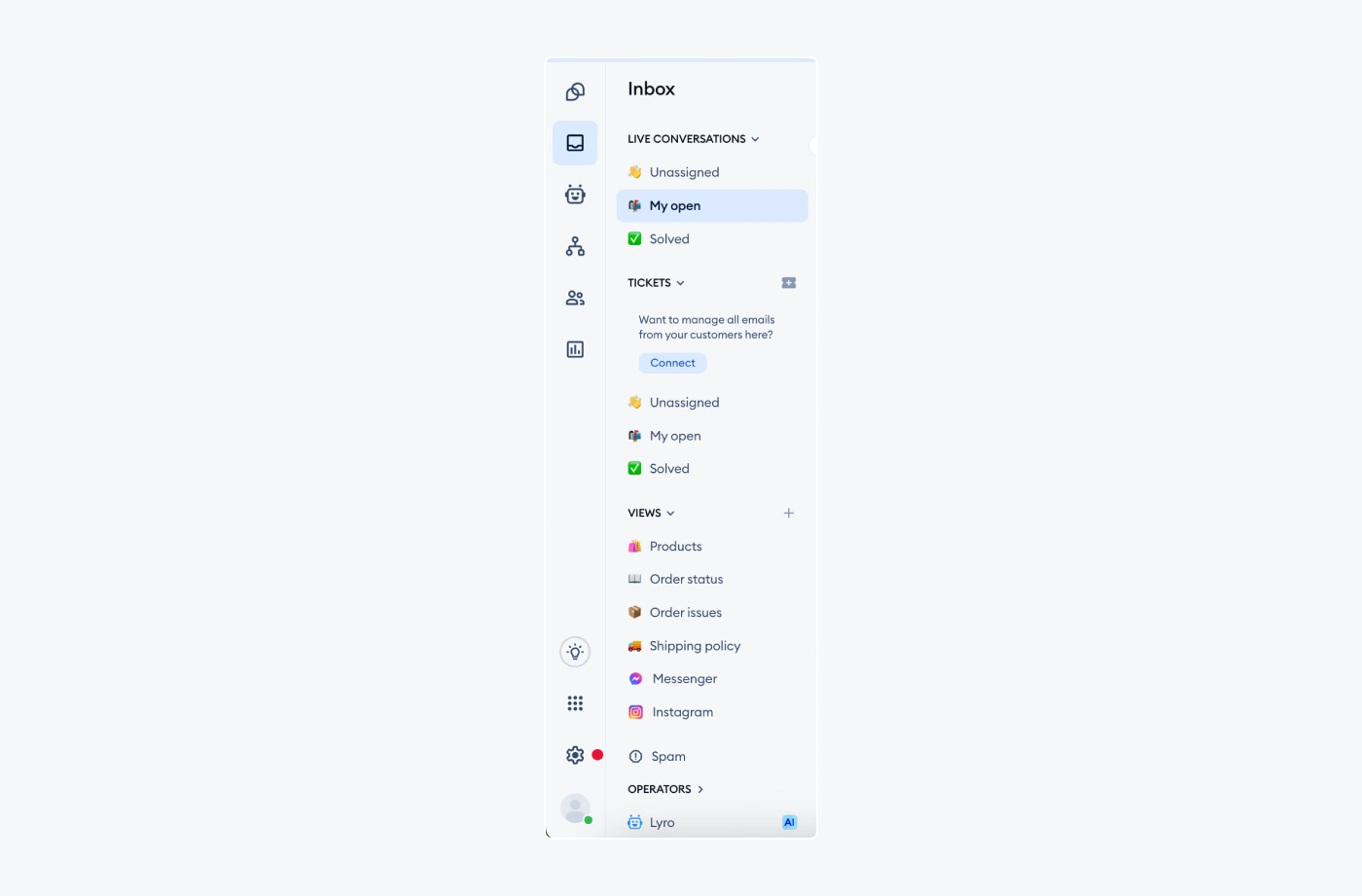
By centralizing communication, AI enables you to automate tasks like routing messages to the right team member, collecting customer data, and answering common questions. This not only streamlines workflows, but also ensures your team stays organized so you don’t miss any interactions.
Let’s say your customer places an order via your website’s AI chatbot but then messages your support through Facebook Messenger to request a delivery time change. Later, they send an email to add a personalized note to the bouquet. All these scattered interactions can easily get lost, and changes won’t be made on time before delivery, which means more complaint tickets for your team.
A single shared inbox fixes this issue and ensures no communication slips through the cracks. Tidio keeps all of your channels, including live chat, email, messengers, and more, tidy in one single view. Lyro AI also helps prioritize high-value or urgent inquiries, and makes sure complex questions are forwarded to the appropriate agent.
5. Offer 24/7 support
Running a floral business means being there for your customers during life’s most important moments — anniversaries, weddings, sympathy arrangements, and last-minute surprises. With AI-powered support, your shop can stay open around the clock, ensuring no sale or inquiry is missed, regardless of the hour.
While you and your team rest, AI works the night shift for you. Whether it’s helping a customer select the perfect bouquet, answering crucial delivery questions, or confirming payment details, AI ensures your business keeps selling, even when the lights are off.
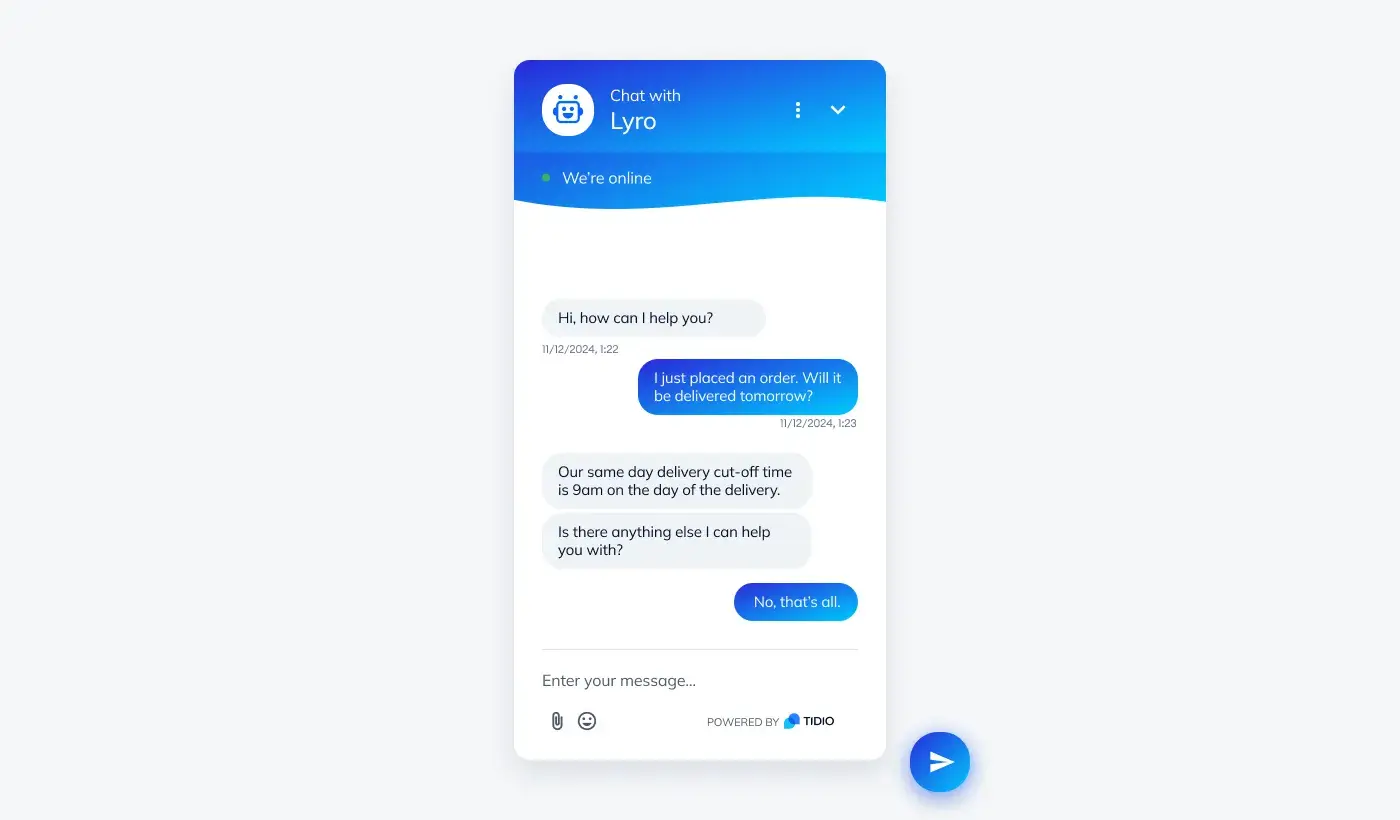
For example, let’s say a customer needs to schedule a next-day delivery for a surprise. Lyro AI instantly answers the customer’s query, providing accurate details about delivery cut-off times, available bouquet options, and pricing. For urgent matters or last-minute changes, Lyro can forward the chat to a human agent for immediate follow-up.
This level of 24/7 availability builds trust, ensures sales, and keeps your customers coming back.
With AI managing the night shift, your floral business can operate at full capacity, offering exceptional service any time of day or night.
6. Collect visitor’s contact information
AI chatbots can help you grow your contact base. If your flower company offers a subscription service or regularly emails about deals, flower care, and more, then you can use a chatbot to collect contact information directly in a chat.
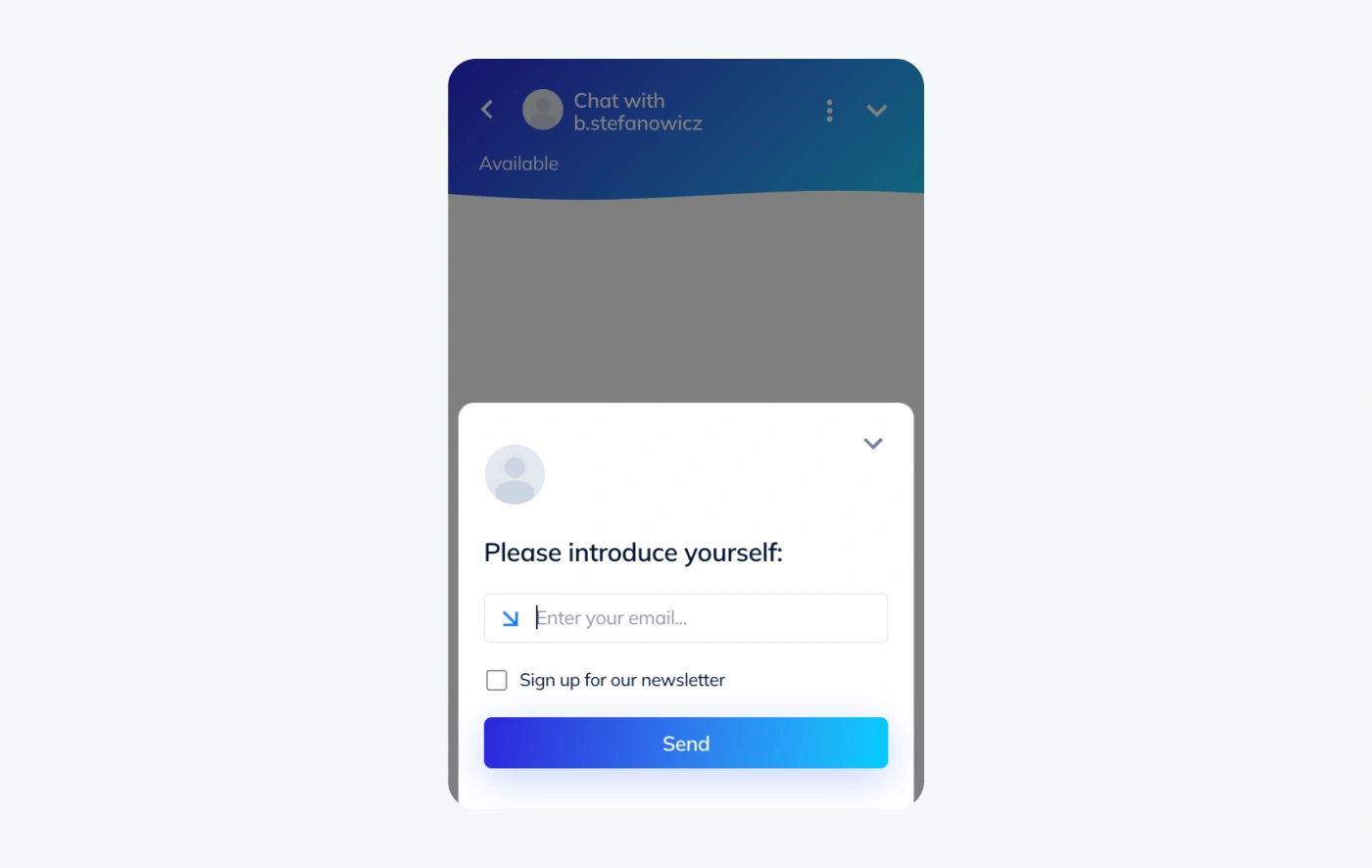
To make it more effective, you can use smart triggers based on visitor behavior. These include time spent on a page, interest in specific products, or first time on your website.
For example, if a visitor is on your Rewards page, you can encourage signups by using a friendly, interactive chatbot that welcomes visitors. These types of triggers easily deliver personalized prompts that resonate with the audience and where they are in their shopping journey.
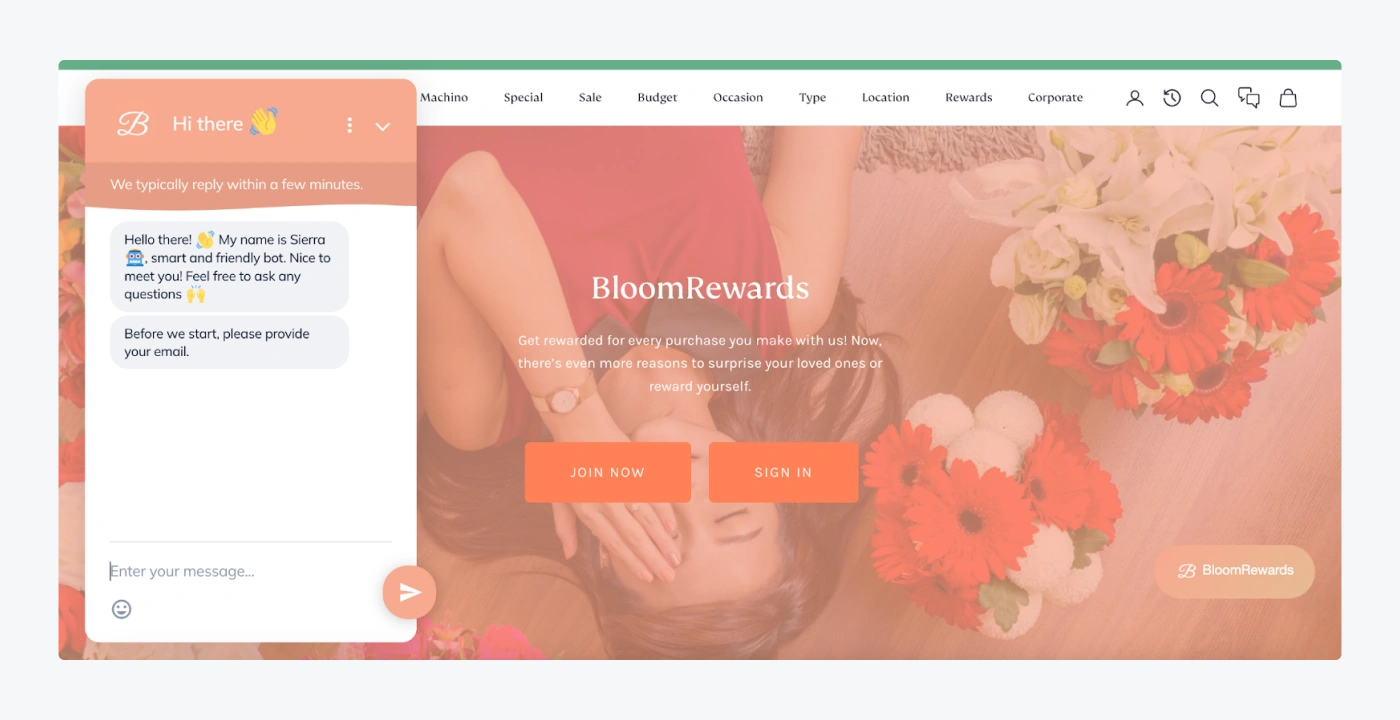
Most importantly, be transparent about how their information will be used and ensure compliance with privacy regulations to foster trust. These strategies not only build your contact list, but also enhance the customer experience, positioning your brand as professional and customer-focused.
7. Give post-purchase plant care advice
Customers often have concerns about keeping their arrangements fresh or maintaining potted plants, and AI-powered chatbots are always available to offer guidance.
Whether it’s advice on watering frequency, sunlight requirements, or how to revive wilting blooms, AI can deliver tailored recommendations based on their specific plant or arrangement. This immediate assistance not only boosts customer satisfaction but also builds trust, as buyers feel supported even after their purchase.
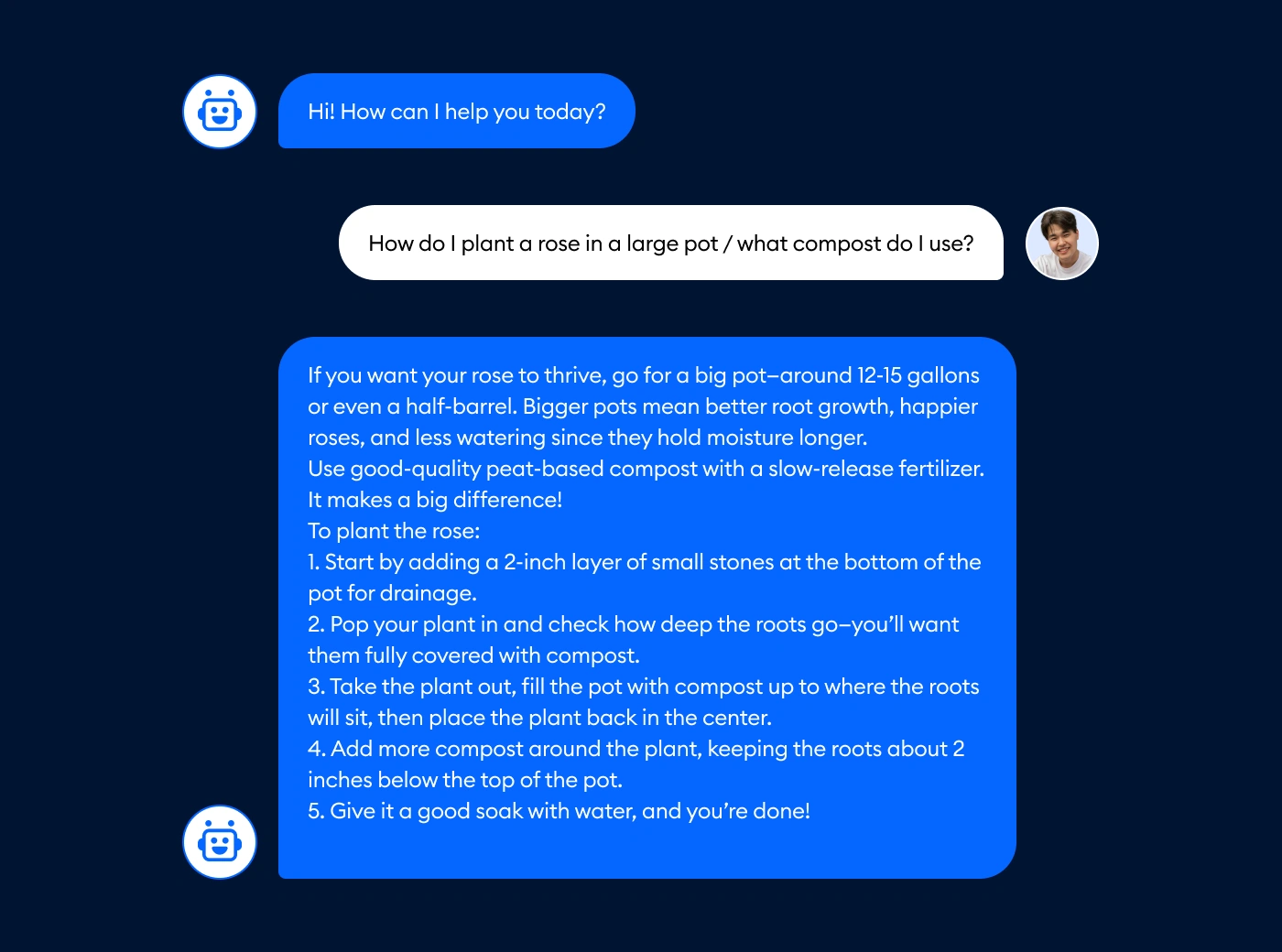
For flower businesses, this capability reduces the burden on human customer support teams, allowing them to focus on more complex inquiries. Moreover, AI chatbots can handle a high volume of routine care questions, minimizing wait times and ensuring consistent responses.
Read more: Learn all about sales chatbots and how this technology can boost your revenue.
Real-life examples of AI for flower companies
We covered how AI chatbots can assist customers with product questions, make recommendations, and help with orders, but how does this look in practice?
Here are three examples of flower companies using AI successfully :
BloomThis
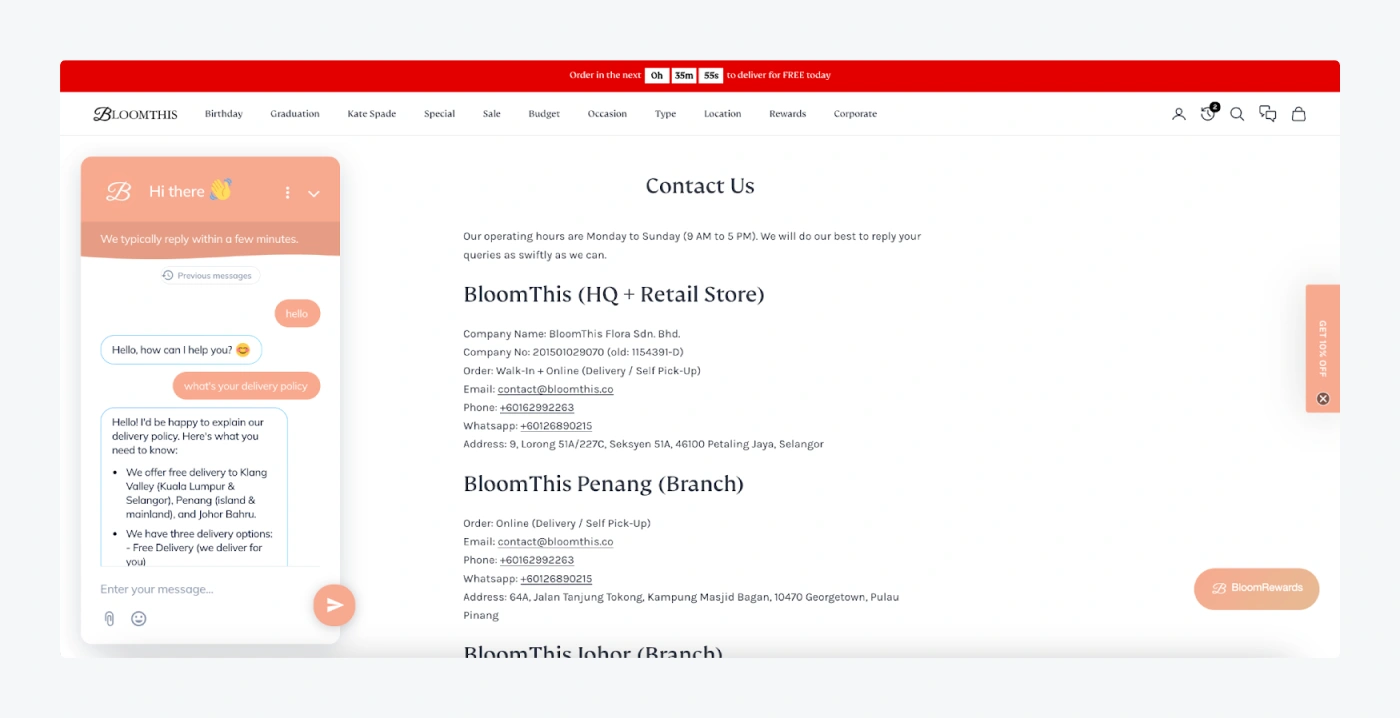
BloomThis offers flowers and gifts for all occasions, including birthdays, anniversaries, graduations, and corporate events. The products you can choose from vary from flowers and personalized cards to balloons, cake, flower stands, and more.
Their AI Agent, named Sierra, is our Lyro AI Agent, but personalized with custom branding—an exclusive feature available only to Plus and Premium customers. Sierra collects leads, answers customer questions, and saves the support team’s time with common tasks and inquiries.
It can respond to all types of FAQs, such as delivery, subscription, and rewards program questions. BloomThis uses their AI to ensure that their support team has time for more complex tasks and all customers are well taken care of.
The Little Market Bunch
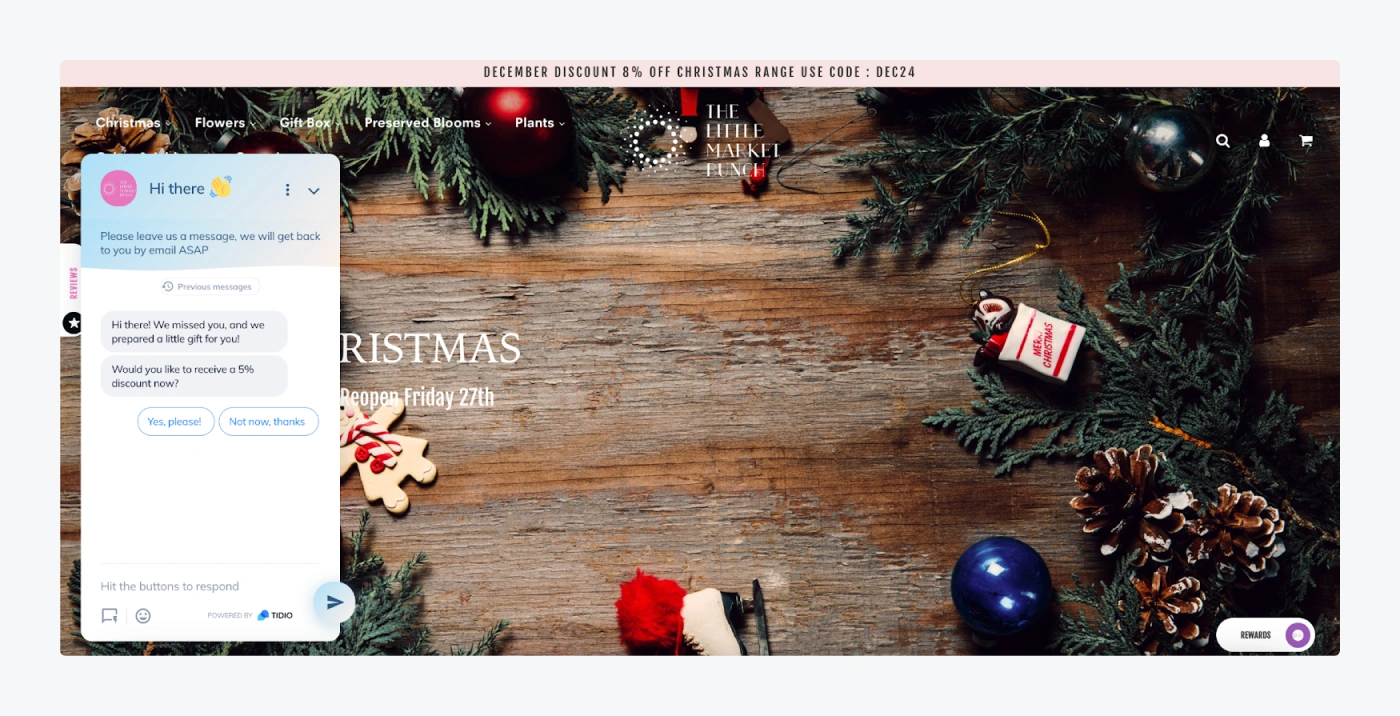
The Little Market Bunch provides flower delivery services and gift boxes available for numerous occasions and in a variety of styles.
Their AI Agent, seamlessly integrated into their website, helps the company handle customer inquiries and repetitive tasks. The chatbot is designed to address common questions about products, services, and policies, providing instant, accurate answers that save the support team valuable time.
One standout feature of their implementation is its proactive approach to customer engagement. When a returning visitor lands on the site, the AI instantly initiates a conversation by offering a special discount, sparking interest and incentivizing action. This strategic use of AI not only streamlines the sales funnel but also drives lead generation by starting meaningful interactions.
1-800-Flowers
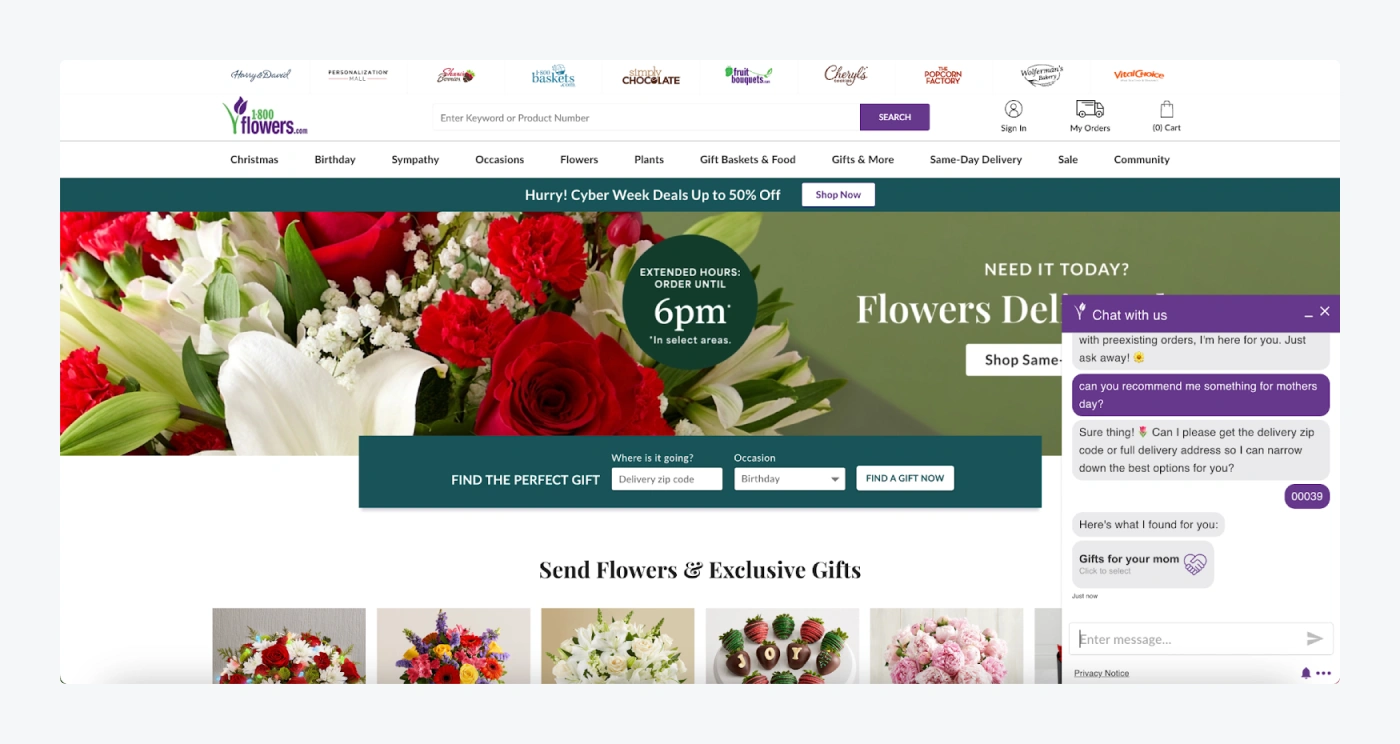
1-800-Flowers uses AI-powered tools to provide personalized gift recommendations through conversational interactions. Through a partnership with IBM’s Watson program, the company introduced “Gwyn” (Gifts When You Need them), a smart virtual shopping assistant designed to help shoppers find the perfect gift.
Gwyn uses cognitive AI capabilities to understand customer queries and chat in a conversational way. For arrangement and gift recommendations, it asks follow-up questions about the customer’s preferences, gift occasion, location and more to refine its answers.
Tidio’s Lyro AI Agent for flower companies
Few AI solutions are built for the demand of peak season in the flower industry. You need a platform that not only gives you a powerful AI Agent, but also a complete suite of channels and features tailored to how you run your support.
Check out Tidio’s Lyro AI Agent. You can train it simply by sharing a URL to your FAQ pages or by uploading your existing knowledge base. This allows it to crawl your question-answer pairs and learn about your business to support your customers.
It also integrates with your existing CRM and favorite tools including Zendesk, Salesforce, Shopify, HubSpot, and many more.
This AI chatbot handles a guaranteed 50% of inquiries instantly with human-like precision, so your team can focus on driving growth. Our AI-powered chatbot learns, adapts, and delivers on-brand support across all your communication channels.
Here are just a few benefits reported by flower businesses using Lyro:
- 62% of inquiries are automated
- Instant responses (typically within seconds)
- 23 hours and 12 minutes saved monthly
So, reach out to our team and set up a call to discuss how our AI agent can help your business be there for your customers at any time, all while increasing sales and loyalty. Sign up today!
Grow your flower business with AI
